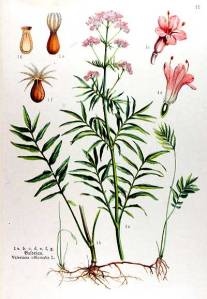Valeriana officinalis Common name: Valerian
Family: Valerianaceae
Parts used: Root
Constituents: Volatile oil (camp hene, borneol), sesquiterpene alkaloids (valerenic acid), Iridoid esters (valepotriates), alkaloids (actinidine, valerine, valerianine, chatinine)
Medicinal actions: Nervous system relaxant, hypnotic, hypotensive, anxiolytic, analgesic, antibiotic, expectorant, bitter, carminative, sedative (paradoxical stimulant), antispasmodic, emmenagogue

Medicinal use: One of the most relaxing nervines available to herbal medicine. Can be used safely to reduce tension, anxiety, and overexcitable states. It is an effective aid in insomnia, producing a natural healing sleep. As an antispasmodic it has a muscle relaxing effect on smooth and skeletal muscles, and will aid in the relief of cramping, neuralgias and intestinal colic. As a pain reliever it is most indicated where that pain is associated with tension, such as in migraines. It carries no risk of dependency and does not effect mental concentration.
Pharmacology:
- Volatile oil (camphene, borneol) are CNS depressants and therefore responsible for sedative, hypnotic and antispasmodic actions.
- Valerenic acid and its derivatives are sedative and antispasmodic. Bind GABA receptors, release GABA and inhibit GABA degradation causing CNS sedation and smooth & skeletal muscle relaxation.
- Iridoid valepotriates are sedative and antispasmodic. Paradoxical stimulant effects may be due to a high sensitivity to valepotriates.
- Alkaloids are hypotensive.
Pharmacy: Crude herb: 0.3-1.0 g daily as powdered herb. Decoction: 3-5 gm QD. Dried root capsules standardized to 0.2%-0.8% valerenic acids: 300-500 mg for sedation at bedtime, 150-300 mg for mild anxiety daily. Tincture: (1:5, 70%), 5-10 ml for sedation; 2.5 ml BID to TID for mild anxiety. High doses should be used for anxiety and low doses for sedation.
Contraindications: Some individuals will react paradoxically to Valerian and will actually be stimulated by it. Interacts with barbiturates. High in arginine, therefore avoid in Herpes simplex virus.
Toxicity: None known.
Interactions: Caution with sedative and anti-depressant medications as may theoretically potentiate effects.


Discussion
Comments are closed.